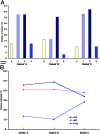Mutations in APC, Kirsten-ras, and p53--alternative genetic pathways to colorectal cancer
- PMID: 12093899
- PMCID: PMC123158
- DOI: 10.1073/pnas.122612899
Mutations in APC, Kirsten-ras, and p53--alternative genetic pathways to colorectal cancer
Abstract
Colorectal cancer is one of the most significant causes of cancer death. A genetic model for colorectal cancer has been proposed in which the sequential accumulation of mutations in specific genes, including adenomatous polyposis coli (APC), Kirsten-ras (K-ras), and p53, drives the transition from healthy colonic epithelia through increasingly dysplastic adenoma to colorectal cancer. We have characterized tumor mutation spectra in a large cohort of colorectal cancer patients. In marked contrast to the predictions of the sequential model of mutation accumulation, only 6.6% of tumors were found to contain mutations in APC, K-ras, and p53, with 38.7% of tumors containing mutations in only one of these genes. The most common combination of mutations was p53 and APC (27.1%), whereas mutations in both p53 and K-ras were extremely rare. Statistical analysis (two-sided Fisher's exact test) confirmed that mutations in K-ras and p53 co-occurred less frequently than expected by chance (P < 0.01, Fisher's exact test). This finding suggests that these mutations lie on alternate pathways of colorectal tumor development. The heterogeneous pattern of tumor mutations in our patient cohort suggests that multiple alternative genetic pathways to colorectal cancer exist and that the widely accepted genetic model of cancer development is not representative of the majority of colorectal tumors.
Figures




Comment in
-
[From adenoma to carcinoma - how fixed are the paths of mutation?].Z Gastroenterol. 2003 Feb;41(2):201-3. doi: 10.1055/s-2003-37312. Z Gastroenterol. 2003. PMID: 16308926 German. No abstract available.
References
-
- Parkin D M, Muir C S, Whelan S L, Gao J T, Ferlay J, Powell J. Cancer Incidence in Five Continents. Lyon, France: Intl. Agency Res. Cancer; 1992.
-
- McMichael A J, Giles G G. Cancer Res. 1988;48:751–756. - PubMed
-
- Potter J D, editor. World Cancer Research Fund (WCRF) Panel. Food, Nutrition and the Prevention of Cancer: A Global Perspective. Washington, DC: WCRF/Am. Inst. Cancer Res.; 1997.
-
- Vogelstein B, Fearon E R, Hamilton S R, Kern S E, Preisinger A C, Leppert M, Nakamura Y, White R, Smits A M, Bos J L. N Engl J Med. 1988;319:525–532. - PubMed
Publication types
MeSH terms
LinkOut - more resources
Full Text Sources
Other Literature Sources
Medical
Molecular Biology Databases
Research Materials
Miscellaneous

